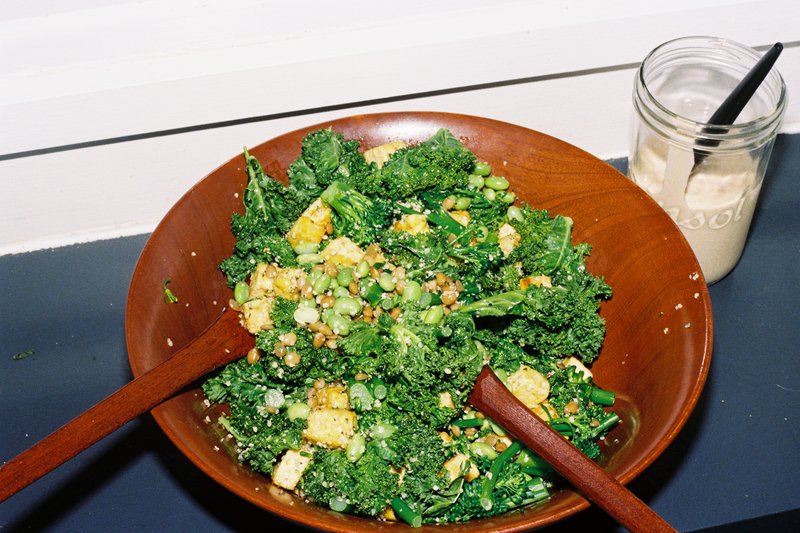As the weather and our environments become increasingly harsh, it is vital we consider the cause of our ailments and adjust our diets and routines accordingly. Mother Nature herself is our healing force, the inherent restorative power of the organism to remove the causes of and overcome disease. Education is vital, and, to those already indoctrinated, there’s always more to learn. Even for those of us eating an abundance of plants, nutrient deficiencies can occur, and ultimately the best results will come from compensating for them via products. For further guidance, view our guide to supplements and what they can do for you.

What role does food play in protecting our immune system?
Food is always first! Our gut is the first line of defence between the outside world and our immune system—and the barrier between the two is only one thick cell. Also, a large part of your immune system lives in your Gastrointestinal Tract. To support immunity, we want a healthy gut. While especially relevant now in the Southern Hemisphere, fortifying your body’s natural defences through nutrition, restorative recipes, and supplements requires taking food as your main guidance, creating rituals and working them into your daily routines. I think it is helpful to think of the immune system and most systems in the body as something that we want to be supported.
16 plant foods to boost your immune system
A strong and balanced approach relies on a daily fortification of the immune system, not only in times of need. That means probiotics and probiotic food, prebiotics—fibre and starch, low or no ultra-refined sugars. Eat as many vegetables and fruits as possible. Frozen is okay too. Incorporate healthy fats, spices, and fresh herbs,parsley, cilantro, thyme, rosemary, mint, et cetera—these are potent medicinal plants. Below is a summary of my recommendations to uplevel your immune system, now and throughout the seasonal cycles. Here are ten foods your immune system is craving.
Blueberries
Rich in anthocyanins, this study found that daily consumption increases Natural Killer cell count (an immune cell best known for killing virally infected cells), reducing oxidative stress and increasing anti-inflammatory cytokines. Blueberries are also abundant in vitamins, including Vitamin C, Vitamin A, potassium, dietary fibre, and manganese.
Broccoli
This cruciferous vegetable offers more than just great plant fibre. A UCLA study showed sulforaphane, a compound found in broccoli, engages a set of antioxidant genes and enzymes in some immune cells that fight free radicals.
Flaxseeds
Abundant in Omega-3 fatty acids, lignans, and fibre, the scientific literature finds such nutrients protective, and more specifically in the treatment of heart disease and in supporting the immune system. Add them to salads, oatmeal or smoothies to boost your intake. Flax seeds are best kept in the fridge for optimal freshness. To prepare a simple egg substitute for baking, soak 1 tablespoon ground flax seeds in 2½ tablespoons water.
Garlic
Extensive knowledge exists on the activity of particular garlic compounds and their health benefits. Rich in sulfur, which supports the body in a number of important ways including disease prevention, one of the most beneficial compounds within garlic is alliinase, a compound activated when garlic is smashed or chopped and allowed to pause for 10 to 15 minutes. Because of this, start any recipes by smashing the garlic first. This way, when you are done preparing your other ingredients, the garlic is in top form, ready for cooking—ready to impart its health benefits and deep, pungent flavour.
Ginger
A natural anti-inflammatory, painkiller, and diaphoretic (a compound that induces sweating), ginger can reduce cold and flu symptoms, indigestion, stomach aches, headaches, and sore throats—lean in heavy during cold and flu season. Take fresh ginger juiced (best prepared fresh if you have access to a juicer) or blended and strained. We love a simple tonic made with coconut butter, powdered turmeric, ginger and a hit of black pepper. Add hot water, blend and drink it in.
Grapefruit
Ripe with Vitamins A, C, and E, a trifecta known to boost immunity, the tart, pithy flesh of a grapefruit contains over 70 mg of Vitamin C. Research efforts today are focused on alleviating dysregulation of immunity—and many of these nutritional interventions, successful in upping immunologic capacity in humans involve antioxidants!
Millet
Incredibly mineral-rich with an abundance of phosphorus, zinc, B Vitamins, calcium and manganese, this super grain can be cooked and served like rice, or cooked longer and with more water to create a savoury porridge. Implicated in anti-cancer activity, the role of zinc in the cellular and humoral immune response—the main human defence mechanism is of importance. The immune system is particularly sensitive to changes in the level of zinc. If required, supplement to fill your dietary gaps.
Mushrooms
The fungi kingdom possesses antiviral properties that help strengthen the body against viruses like cold and flu. Notably, edible mushrooms contain beta-glucan polysaccharides, a carbohydrate known to enhance immune response. An abundant source of fibre, protein, B vitamins, copper, potassium, magnesium, zinc, selenium and glutathione, and Vitamin D, when you're eating mushrooms you're absolutely getting these nutritional benefits.
Kumara
Plentiful in beta-carotene, which converts to Vitamin A in your body, the tuber is effective in neutralising free radicals that helps bolster the immune system and may even improve the ageing process. An even richer source of anthocyanin pigments, with high antioxidant capacity, kumara or sweet potato, as they are known outside of Aotearoa, reduce inflammation and boost your immune system.
Spices!
Cayenne, chilli peppers, jalapeno, turmeric. Anything that turns up the heat and makes you flushed and well-circulated. Many of these ingredients increase T-cell function, which you can think of as our bodies’ fighter cells.
Fermented vegetables
Some may consider kraut an acquired taste but if you incorporate it slowly and commit, you’ll undoubtedly find yourself craving its brightness. Most important, fermented foods deliver a spectrum of beneficial bacteria that encourage optimal digestion and supports the immune system. Beyond the classic green cabbage sauerkraut, if you Google, you are likely to discover someone in your area making pickled vegetables. Now that I am in Naarm, I have access to Acide! Better still, make it at home. Amandine’s husband, Benoit, in fact, has become something of a master. You’ll find his method for preparing sauerkraut here.
Almonds
Embracing a plant-based diet means seeking alternative protein sources, you may find yourself relying more heavily on nuts and almonds are for many a wonderful food. Compared to other nuts, almonds provides the highest or among the highest amounts of fibre, protein, monounsaturated and polyunsaturated fats, magnesium, calcium, iron, folate, riboflavin, niacin, vitamin E, phytosterols, flavonoids, and phenolic acids. A consistent approach to including almonds in our diets, we’re met with a dizzying array of general health and targeted health impacts that build on immune protection.
Greek coconut yoghurt
This ancient ingredient has been a part of Greek culture for thousands of years, discovered around 6000 B.C. and will likely be around for another thousand. Strained, resulting in a thicker consistency, yoghurt contains probiotics—the catalyst for transforming milk into yoghurt. Versatile enough, we turn to coconut, and the Greek variant is one of our favourite items in the fridge; coconut yoghurt makes its way into our meals with high frequency and is a key ingredient in our tahini dressing.
Dark chocolate
When your chocolate is high quality beyond being delicious, it is also incredibly rich in benefits for your body and mind. Dark chocolate is packed with antioxidants (40 times the amount found in blueberries, for example, and most is rich in plant chemicals, antioxidants called flavanols linked to a lower risk of heart disease. In theory, dark chocolate will contain higher flavanol content (greater health benefit). The main flavanols found in cocoa are epicatechin, catechin, and procyanidins. Heavy in magnesium and a known mood enhancer, always keep a bar on hand.
Spinach
A mighty source of vitamin C, spinach is also packed with numerous antioxidants and beta-carotene, which may increase the infection-fighting ability of our immune systems. Not unlike broccoli, spinach will retain its nutrients and the associated benefits when cooked as little as possible. Spinach is an easy green to work into a day of eating. Make a habit of it.
Pomegranate
These super tart, super delicious fruits are rich in symbolic and mythological associations and are loaded with vitamins A, C, E, and folic acid, making them a superior food for skin health and immune support. And, because of its high antioxidant score, it is demonstrated that certain components of pomegranate, such as polyphenols, have anti-viral, anti-bacterial, and anticarcinogenic properties. Their jewel-like seeds are said to prevent or treat various disease risk factors, including high blood pressure, high cholesterol, oxidative stress, hyperglycemia, and inflammatory activities. Some say they are the healthiest fruit on the planet! Read more on the potent effects of pomegranate.
Immune-protective and bioavailable supplements
These nutrients will fill in the dietary gaps required to maintain digestive wellness and support immunity, energy, mood, and skin during the colder months and beyond.
Vitamin D
Deficiency in this vitamin is associated with increased susceptibility to infection, and 35 per cent of adults in the U.S. are clinically deficient in Vitamin D, while an even greater number have insufficient levels. Aim for 5000 IU per day.
Recommended product—Garden of Life, MyKind Organics, Vegan D3, Chewable Tablets
Buffered Vitamin C
Daily use of vitamin C has been shown to lower the likelihood of colds and flu, reduce antibiotic use, and reduce school absences in children. People who take vitamin C regularly can expect shorter colds (by 8 per cent in adults and 14 per cent in children) with slightly less severe symptoms. A 2018 meta-analysis also supports that vitamin C can shorten colds and lessen symptoms. The recommended dose is 500 to 1,000 mg daily for kids and 1000 to 2000 mg daily for adults.
Recommended product—California Gold Nutrition, Buffered Gold C Powder
Zinc Citrate
A daily supplement with zinc reduces colds and flu. Dosage or Recommended Dietary Intake (RDI) depends on age. For adults, it's 30 to 60 mg per day. For kids over six months, the daily dose is 6 to 12 months: 2-3 mg; ages 1 to 3: 3 mg; ages 4 to 8: 5 mg; ages 9 to 13: 8 mg.
Recommended product—NOW Foods, Zinc, 50 mg
Probiotics
Probiotics are going to help you strengthen your gut lining and balance the bacterias, protecting your gut and supporting your immune system. Keep things in balance by supplementing the probiotics naturally through fermented foods and soil. (Not overwashing our vegetables can be a source of probiotics). When supplementing, go for a probiotic supplement that contains Lactobacillus and Bifidobacterium strains.
Recommended product—California Gold Nutrition, LactoBif Probiotics, 30 Billion CFU
Plant-Based Omega
Omega-3s strengthen immune response by balancing the ratio of omega-6 to omega-3 in the body, which directly calms chronic inflammation. Recent research finds microalgae to boost omega-3 in the body, antioxidant enzyme activity, and immune response. Fish get their Omega-3 content by eating algae, so why not go straight to the source?
Sea Buckthorn Berries
These super tart, super-delicious and superfood berries hail from the Himalayas and are loaded with vitamin C and Omega-7’s, making them a superior food for skin health and immune support. Add a dash of Sea Buckthorn Berries and bitters to sparkling water for hydrating tonic.
Recommended product—SeaBuckWonders, Organic Himalayan Sea Buckthorn Seed Oil
Quercetin
A plant flavonoid and natural antihistamine, viruses are known to produce an inflammatory response that impairs the immune system, so this quercetin can help calm inflammation and keep your immune system highly functional.
Recommended product—Source Naturals, Activated Quercetin
Elderberry Syrup
A pure immune stimulant abundant in antioxidants, elderberry has been used for centuries to boost immunity. The dose is one tablespoon, three times daily for adults. Modify for children down to one-fourth of the dose ages 2 to 7 years old and one-half the dose 8 to 12 years old; safe for pregnant women for a limited time of five to seven days.
Recommended product—California Gold Nutrition, Adult Sambucus Elderberry
This content is not intended to be a substitute for professional medical advice. Always seek advice from your healthcare provider before altering your routine.








